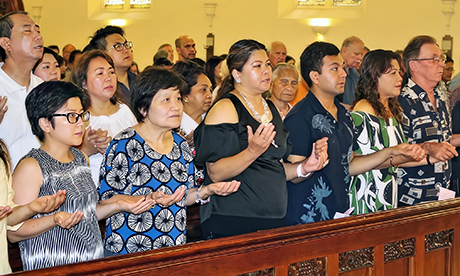It seems no sooner than all Covid restrictions have been lifted from Catholic churches – the sneeze-proof face mask, the empty holy water stoup, the contactless signs of peace, that a selection of lurgies have made themselves known.
The rising number of Covid cases, hospitalisations and deaths suggest we could be in for another rough winter.
Although as of Sunday, the number of Covid cases dropped from the previous week’s recent high, 14,242 cases, Covid isn’t the only illness that Kiwis’ have to contend with.
Otago University infectious disease expert Dr Jemma Geoghegan says other more established viruses must also be considered this year.
Open borders have led to larger outbreaks.
There was a big one last year. And many new flu cases have been introduced to New Zealand this year, Geoghegan says.
New Zealanders should take this as a warning to get up-to-date with not only Covid boosters, but also the flu vaccine, she says.
“Immunity has waned, and it’s probably quite some time since most people have had a booster or vaccine.”
Geoghegan explains that vaccine technology has moved on quite significantly from when most of us received our first batch of shots.
“The new bivalent vaccine includes not only protection against the original strain that first emerged in Wuhan, but it also includes the Omicron spike protein.”
“With anything that includes Omicron, this [vaccine] should give better protection than the previous version of the vaccine.”
While agreeing with Geoghegan about the importance of getting a Covid booster, University of Otago colleague, epidemiologist, and professor Peter McIntyre said it was time to ‘de-prioritise’ the response to Covid-19, which will now be no worse than the flu for the majority of the population.
McIntyre says the focus should now be on getting those at higher risk double-boosted rather than worrying about infection control through increased mask-wearing or improved ventilation.
What lifted restrictions mean for Catholics
Parishes are free to offer Communion in both the form of bread and wine.
Many, however, have opted to keep the Covid restrictions in place.
For those who are offering the chalice:
- Ministers of the Chalice must “practise the usual procedures when ministering, including wiping the chalice both inside and out (with a clean part of the purifier) and rotating the chalice between recipients.”
- Remind parishioners they may receive only from the chalice if they are well.
For those ministering to those who are sick, elderly or immunocompromised:
- People are free to offer a Sign of Peace with a handshake – or “a genuine word of peace and a warm smile”.
- Masks are no longer required. Parishes may choose whether they want people distributing Holy Communion to wear a mask.
- Holy water can be made available at the entrance. This water should be refreshed regularly.
- Ministers of Communion to the sick and homebound are encouraged to ask those receiving the Sacrament if they would like them to wear a mask.
Source
